A friendly analyst within Government has helped SoW understand the shape and depth of the Forest Panels report and suggests how we can help encourage Government to develop the recommendations into forest policy for England’s woodlands and forests, both public and private.
Summary
The report makes a real attempt to address the impossible task set them by Caroline Spelman in February 2011 but displays DEFRAs lack of bravery as well as the dead hand of the Treasury. The whole report is predicated on a change in accounting for the natural environment that will cut no ice with Government.
The core of the report – on the direction forestry should take – gives the Government the opportunity to substantially accept the report, in the guise of implementing the bulk of costless and probably ineffective recommendations, in the body of the report without addressing root causes of the problem. In this part of the report the added value comes from the implicit recognition that it is the private sector, and not the Public Forest Estate, that is failing the nation.
The final part of the report – about the fate of the Government institutions makes sensible, although hardly novel, suggestions about the separation of ownership of the Public Forest Estate from the delivery of forest services and describes how this could be played into the main agenda – to make more and better use of our woodland – especially where it is privately owned but poorly managed. While eminently sensible the outcome is probably legislatively impracticable in the current political climate.
When you look at the report in the context of the current political environment, and look at potential allies in Government, the conclusion must be that, at least in the short term, the report will make no difference whatsoever. But that does not make it valueless; it has clarified the position for all those outside Government even if it has failed to do the same for Government itself. And those of us outside Government need to recognise that it is we who need to cherish the report and continue to hold the Government to account in the long game that continues to play out. And we will need to guard against a gradual creep towards objectives such as sale and privatisation which may yet be said to be necessary to safeguard woodland as a whole or to deliver the Report’s objectives.
Political Background
It is worth remembering that the commissioning of the Panel’s report was a delaying and diversionary tactic. The remit was set very wide; understandable when the creation of the Panel was announced to deal with an immediate presentational problem and probably before anyone had any idea what it should do. Remember the Terms of Reference were:-
- To advise the Secretary of State for Environment, Food and Rural Affairs on the future direction of forestry and woodland policy in England.
- To advise on the role of the Forestry Commission in implementing policy on forestry and woodland in relation to England.
This is really pretty vague and perhaps it is designed to make it hard for a committee to agree on what their role really is in the time they had available. And of course the membership of the Committee was very uncertain at the outset and, as happens so often, places were allocated to the bigger political beasts in the Environmental and Forestry areas. People unlikely to quickly agree how to go about the task of collecting evidence and then focus on how and what to deliver to address the wide remit.
Initially the Committee was simply a lightning-rod. The immediate Government need was to get the presentational disaster of the Forest sell-off out of the media and that meant promising that the Committee would provide the link between the people who care and decision makers. But looking at the aspirations of the report, as commissioned in the Terms of Reference, it implies that there is a hidden truth that has been missed by Government but is recognised by citizens. I have to question whether Government really expects there to be some deep insight in the report. While the panel may look like a mechanism to tap into the “Wisdom of Crowds”, Government is not set up or open enough to use insights even if they are captured. Reports tend kill, rather than capture, insights.
And now that the report has been published we should recognise that the political backdrop has changed. Of course that was the intention of setting up the review; it gives politicians an opportunity to move on so that the committee reports in a different environment to the one where it was set up. Leaving aside my surprise that Government has not taken the opportunity to pre-empt the report in key areas (so that it became substantially irrelevant) by making changes to the Forestry Commission and Forest Enterprise the big political backdrop is not the one against which Caroline Spelman launched the debate on “The Future of the Public Forest Estate in England”. When the firestorm started the new coalition government was certain of its direction and that was to reduce bureaucracy, have a bonfire of the Quangos and promote “The Big Society” where assets and functions were owned and looked after or delivered by a local community for its own local benefit. And at this stage the Blue/Yellow coalition was working well and with a high level of common purpose.
That is not the case currently, the Government looks less certain and I can no longer say that Blue and Yellow work well together or that they still exhibit a common purpose. All the evidence from the Budget, gay marriage and reform of the House of Lords all suggests that Blue and Yellow have split within Government and they tolerate each other only to get basic business done. And the “Big Society” idea (upon which the questions in “The Future of the Public Forest Estate in England” were predicated) has not stood the test of time.
Finally, there are no Government Ministers I can see with any environmental credentials, and no paid Special Advisers either; not even in DEFRA. And if we assume, as I think we should, that the Blue party will always tend to prefer the market to the state, and privatisation to social ownership, there is a worrying lack of anyone of a yellow hue with any knowledge of (or even a love for) the environment in general and our woods and forests in particular.
The Shape and Depth of the Report
I have to commend whoever structured the report; I think that it does its very best to address the rather vague Terms of Reference in a way that tells a positive and heartening story. I am sure that the report reflects the feelings of the people the committee met and, as the report moves along its narrative thread, it makes a lot of good points that are all too easily missed because they look so blindingly obvious. But, with the exception of Section D, there are no new insights here and I still see the dead hand of the Treasury, DEFRA and the Forestry Commission.
Perhaps this is understandable. In looking at why the recommendations are as they are, and why some of them are necessary, it is important to remember that the Committee was not given a free hand. In the Terms of Reference the conditions were set out like this:-
3) In formulating this advice, the Panel should consider:
a) how woodland cover can be increased, given competing pressures on land use for food production, energy and development;
b) options for enhancing public benefits from all woodland and forests, in the light of the Lawton Report and the Natural Environment White Paper, including:
- public access for recreation and leisure;
- biodiversity, wildlife protection and ecological resilience, including through restoration of open habitats and plantations on ancient woodland sites;
- climate change mitigation and adaptation;
- economic development, particularly to support a sustainable timber industry and a wide range of small and medium sized enterprises, including social enterprises; and
- engagement and participation of civil society.
c) constraints and competing demands on public expenditure for this Spending Review period and beyond;
d) the role of Forest Enterprise England as the manager of productive forestry resources;
e) the value for money and cost-effectiveness of the public forest estate in England and options for its future ownership and management
This is what made the committee’s job nigh-on impossible; they drive the need to prove that more woodland is preferable to food security or effective housing and that it is a better investment that can be got without more Government expenditure and in the knowledge that there are FE jobs at stake and that there is a privatised forestry industry wanting to make economic profits.
I can also see how, in struggling with mismatch between the Terms of Reference, the presentational need to connect with the public after.
The Thrust of the Report – Where it points us
To me the Report makes a number of simple but important assertions, and then makes a sensible but probably unattainable suggestion. It says:-
- We do not value our woodland properly because current economics does not measure all the things woodlands are best at delivering; current metrics would lead to perverse outcomes,
- People like, enjoy and appreciate woodlands and the intangible benefits are already recognised in other areas of Government policy and the links should be encouraged,
- Woodlands are part of the natural environment (cf timber plantations) and there should be closer links to this role in the plans Government already has; and those plans should be more coherent,
- Woods are part of the economy and we simply don’t make enough economic use of what we have got, especially in the private sector.
It then goes on to address the second issue in the Terms of Reference and looks at how FC and FE deliver into this agenda. Essentially the call is for:-
- Ownership to be separated from delivery,
- The delivery arm to work closely with private owners for the public good, and
- Forestry policy should be joined up across national boundaries.
In all of this I see both the dead hand of the Treasury and the chip on DEFRAs environmental shoulder. Recommendations are about safe, nil cost, options that join up with the existing fragmentary provision elsewhere in Government to deliver small incremental benefits. And references are to environmental reports and initiatives that are stalled or gathering dust on the shelves of enthusiasts – of which there are none in Government.
So the way in which the report is structured means that it fails to bring out some really interesting themes. These are mine:-
- The report would have been unnecessary if Government had read, and then thought about, the material which was already available – Government must get a grip and decide what it wants,
- Woodlands bring benefits; not all of them can be enumerated – Stop hiding behind the accountants,
- There are already policies, right across Government, that link to woodland use – Start by joining up the dots within Government,
- Bigger benefits would come from more woodland but the biggest immediate benefits would come from making the most of the woodland we have – Act to bring current woodlands into good management – especially in the private sector,
- Private sector woodlands present the biggest challenge – Target support (and that doesn’t mean just money) on those private woodlands to get then to deliver like the Public Forest Estate, and
- Reorganise the Government infrastructure to safeguard what we hold publically and focus expertise where it will do the most good – Do something constructive with the Forestry Commission and Forest Enterprise to fit them for their tasks.
I’ll add another one which is implicit in the way in which the public have responded to the Panel even if it does not quite shine through in the report – Celebrate our woodlands and just how wonderful they are.
It’s a shame that the report tends to look like a sales brochure for DEFRA’s agenda within Government; unfortunately DEFRAs “environmental” arm is powerless and voiceless.
The Recommendations
There are some key recommendations, in bold, in the report from which other recommendations flow. There is an initial overall recommendation about valuing our woodland before the report settles down to make recommendations about “Trees & woods: good for people”, “Trees & woods: good for nature”, “Trees & woods; good for the green economy” and “Managing our woodland asset: the role of our forestry organisations”.
The first main recommendation in “A Woodland Culture for the 21st century” deals with the constraints, especially 3(a) & (c) upfront. The report sets out to say that the key to balancing pressures for conflicting land use or public expenditure is to measure costs and benefits differently to how we do now. Notwithstanding the setting up of the Natural Capital Committee and the publication of the National Ecosystem Assessment, the National Accounts, the calculation of the deficit and international accounting generally takes no account of what NCC is attempting to do. And that means that the challenges posed by both 3(a) & (c) are currently not resolvable. This is the report’s main weakness and, given the importance of the Treasury and another impending Comprehensive Spending Review to reduce Departmental spending further, it is likely to be the bit of the report that Government will not (and arguably cannot) accept.
The next part of the report addresses the first question in the Terms of Reference; “To advise the Secretary of State for Environment, Food and Rural Affairs on the future direction of forestry and woodland policy in England” and splits the question thematically in relation to how trees and woods are:-
- Good for people,
- Good for nature, and
- Good for the green economy.
The swathe of recommendations in this part of the report are benign – and must certainly be accepted in full by the Government because they need not change anything. In a nutshell the recommendations are to give more people access to woodland, integrate woodland in the natural environment plans and make better use of them commercially; and all of these things can be achieved together.
The final part of the report suggests how the current bodies, the Forestry Commission and Forest Enterprise might be structured to deliver the sort of outcomes that the panel identify. Currently the legal framework is a mess; ask simple questions about the Forest of Dean or the New Forest and you are immediately in a legal swamp. Ask about the legal framework for the current obligations of the Forestry Commission and you are on similarly difficult ground, made more difficult by the addition of environmental objectives to a historic remit of timber supply for a nation on a war footing. And ask about the legal framework for Forest Enterprise and you see a further over layering with the creation of a service agency in the heyday of Agency creation in Government. None of this provides the sort of foundations on which to implement the report’s structural recommendations.
So the report’s suggestion that there should be a legal and practical separation of functions is very sensible; but ‘brave’ in legislative terms. It is also absolutely right to suggest that the ownership of the Public Forest Estate should be vested in a new organisation which should hold it in trust for the nation and hence take it out of direct Government control. And there is very clear logic behind wanting to grow a new Forest Services organisation to drive forward many of the report’s objectives. The problem, like so many in Government, is not in identifying where we a want to end up but how to get there.
There would need to be a Bill to do all this and it would need to fully unpick the current position before all the threads are woven together again in the new structure. It is not that it would be impossible to do; quite the contrary. But the likely complexity of the legislation that will need to be unpicked means that, in practice, the size of the task makes it administratively unattractive to a Department like DEFRA with scarce policy and legal resources. And it goes without saying that even if a Bill could be drafted some knotty questions would need to be answered about functions and safeguards which would need both political will to address and policy capacity to handle through consultation and stakeholder management. And should the issues be resolved and the Secretary of State is confident that the Bill would get a fair reaction from public and industry there is still legislative space in the timetable to be fought for; and she would need to demonstrate that the outcome of the Bill would be more advantageous (and win more votes) than a raft of alternative Bills supported by Cabinet colleagues. Life for the Secretary of State might be easier if the Bill was short and uncontroversial; but it would be neither.
And that’s why the sensible structural suggestions in the report are ‘brave’; they are out of their time, especially if we are, as I have suggested, in the early run-up to an election that will look to differentiate between coalition parties. So, like the accounting aspirations at the start of the report, the structural changes will need to await “the right time”; not because they need national accounting to recognise natural capital but so that the balance of political cost and reward tips so that a good idea can have its day.
Where Next?
If reports kill, rather than capture, insights then where does this leave us?
The plea for alternative accounting is unlikely to get any traction in Government however hard DEFRA push for it. This needs to be parked with the Natural Capital Committee where I fear it will gather dust.
The raft of costless proposals and calls to join up within Government are the things which Ministers can applaud without political risk. Failure here will always be someone else’s fault and accountability is easily obscured as is any effect on the ‘little measures’ on the bigger objectives. Expect these to be trumpeted as a triumph and them forgotten.
Sensible ideas, like the final structural proposals in the report, often have their day early in a Parliament, especially where a Bill is ready to go because it is fully thought out, substantially pre-drafted and has a Ministerial sponsor who needs to make a name for themselves early in their Ministerial term. It would be nice to think that this could happen here. Remember, however, that this idea is unlikely to get support from the current Ministerial team, none of whom would benefit from it and that it represents an upfront cost to a Department which does not seem to care much about woods.
Things to watch for …
There is also a sub-text to the report; there is a conclusion that should only be whispered. Woods are emotional, that means there is a “Woodland Vote” (cf the “Grey Vote”) but, like all such voting sectors, it slumbers most of the time. Politicians look at votes first, Party second and good Government comes a poor third. The place to look for an example is the “mutualisation” of public services driven by Cabinet Office; particularly Francis Maude.
The ostensible aim of Mutualisation is to enable services to be delivered locally and to give the people who deliver them (and who therefore know most about them) a stake in the success of their delivery. The aim is not to privatise services (although the Blue Party would support that) or to drive down costs (although that is the aim of all service delivery across Government). So let us look at a scenario where care for the elderly is passed to a mutual service delivery organisation made up of the carers in a Local Authority.
The initial contract may well be cost effective because, with additional commitment by staff, and their knowledge of the service, there are likely to be efficiencies they can make. This is unobjectionable. But let us say that to make internal efficiencies, local authorities group together to share services and place contracts, such as those for care of the elderly, efficiently and with lower administrative cost. This is unobjectionable. But the mutual service provider for an individual local authority will either be too small to bid for the big contract, or is likely to be undercut by a bigger provider who might be able to use economies of scale. In deed the small mutual might be taken over by the bigger contractor to give them the local capacity to deliver the services in their area. And there we have it – privatisation by a route where each step is logical and acceptable but where there sum of the steps is the very thing the original policy is not supposed to achieve. And the fault is with market forces and not with the policy.
What relevance has this to the Report? I would be concerned that because the Panel was a response to an immediate presentational difficulty and because the recommendations in the report which the Government can accept immediately require little real action; the report can be put on the shelf to await “the right time” to implement the more radical proposals. Meanwhile the world moves on and, perhaps as a result of local restructuring or the gradual erosion of numbers and experience of Government staff, it becomes impracticable to implement some of the recommendations in the way the report envisages, it may become necessary to downsize the public estate to enable what remains to be managed efficiently and the management might be better performed by private contractors who can be brought in under tight central direction. But, rest assured, the objectives set by the report’s recommendations, and Government’s policy for woodlands, will, of course, remain the same.
I do not like this scenario; it is not what the report recommends overall; even if the individual objectives are each taken forward. The danger is that the whole will be smaller than the sum of the parts. What is lacking, and what we must do, is to collectively hold the Government to account.
The value of the report is not in the words on the page or in the recommendations, however worthy they are, but in the way that it confirms that there is a “woodland vote” which can be stirred up and that activists are not extremists but concerned representatives of that larger body of voters.
The regular question for every Minister, MP and Councillor should be; what are your intentions for the PFE and what will you do to ensure that the Panel’s objectives are fulfilled; and then to test the glibness of the answers in long-term scenarios like the one above.














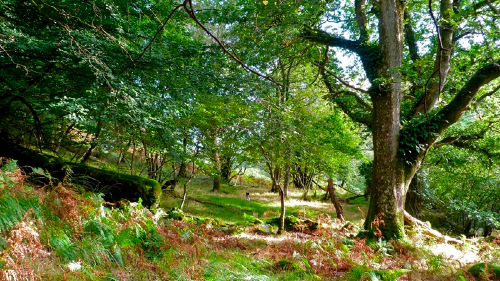
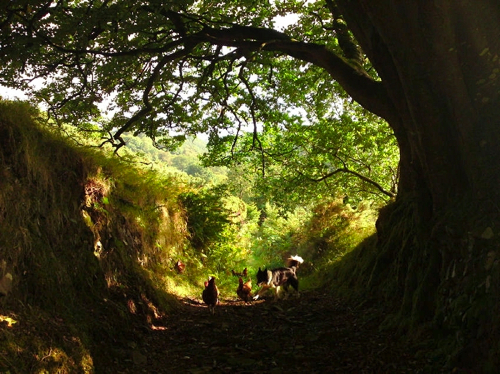


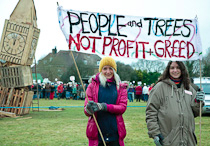


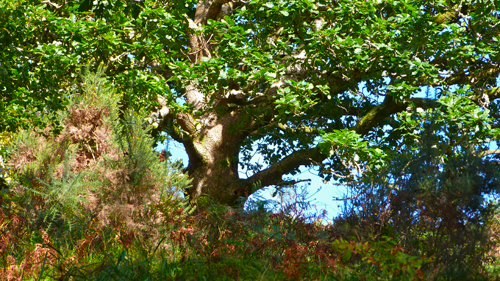


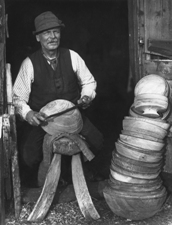



The government might grasp a golden opportunity to do what they wanted to do a year ago — to move the management of the PFE to the third sector and private sector and to let it resource itself. This would be the outcome of implementing the recommendations in the report, and this would be the outcome that some campaigners and analysts seem to support by their calls to replace FC and separate the ownership and management of the PFE. Is this hiving off really the outcome everyone who fought to save our forests wants?
The FC in England has been forced to impose the government’s 25% cuts, and has let staff go, created much larger regions that fewer staff have to cover, outsourced areas of work, and stopped doing a number of important functions.
These cuts have pre-empted the work of the panel, and together with the loss of expertise and the local focus mean that it will be much more difficult to implement an expanded role for the FC, to run an expanded PFE and to encourage more expansion and management in private forestry. As the article says, if nothing is done, restructuring and loss of staff in FC could mean it would be impractical to implement the recommendations, leading to the possibility that the PFE could be downsized and privatised.
We think that what we should do is to fully fund the Forestry Commission and strengthen its remit by amending forestry legislation so that it can do what we all want it to do – to take forward the many laudable forestry policy ambitions in the report (which build on the work it already does) – to make sure we all get the most possible benefit from our forests and woods, for people, for the economy for nature, and for the environment.
There is growing evidence that some people just won’t accept public opinion – in particular a number of ‘interesting’ proposals flying under the cover of ‘community’ which look at the best end like an attempt to erode the panel’s conclusions on public ownership and at the worst simple smash and grab raids where the big corporations will emerge as the shattered glass stops falling.
I really do hope the Government (and others) won’t try any dirty tricks – my starter for 10 is the old, old trick of taking away your Local FC Ranger and then offering the same money back to a community group to replace him (or her !). Please don’t fall for it especially as you’ll find the bribe only last 3 years and then you’ll be back to where you started.
Remember that the people behind the sell off are powerful and they are the sort of people who expect to get their way (and that, I’m afraid extends to places it shouldn’t like some NGO people). They haven’t liked what happened at all – not least because it has shifted the balance of power away from them – and I sense an underlying current aimed at getting their own back on FC in particular. It is very, very sad and terrible for the future of this country when a group of dedicated, imaginative and very hard working public servants are effectively being vilified for achieving what politicians always say they should be doing – getting closer to real people and delivering what people want. It is just a relief that real people understand this – but the challenge is now to insist that the panels real recommendations stick and that we don’t allow people who’ve been against the whole popular movement cherry pick and distort the panels thinking to their own, negative and destructive ends.
The key thrust of the article is ‘Will the government take forward the panel’s recommendations on organisations to manage the PFE and forestry in the future?’ I agree that this is a key question, but would add another question — ‘Should they implement them?’ I think the answer to that is NO. And I believe that campaigners who saved our forests from sell-off, uniting in the call for our public forests to be run by a fully resourced Forestry Commission, should now be saying NO to the replacement of the Forestry Commission.
Will the government implement the recommendations?
The article says that in the current political context it looks unlikely that the government would implement it. Legislation to do so would be complex and controversial, with a lot of tricky questions about the functions of the new organisation, safeguards and consultation and stakeholder involvement. It would be difficult to find Parliamentary time for something that could be controversial, and resources are scarce for the task. The article suggests that the government might put the recommendations on the shelf for another time.
This is a convincing analysis. I would agree that there are a lot of questions, safeguards would be essential, and for it to happen there would have to be consultation of all stakeholders including the campaign and user groups that worked so hard to save our forests and the unions that represent the staff who make the FC such a success.
We will have to see what the next few months bring and what the government response in January says.
Should the government implement the recommendations?
The article suggests that the management of the PFE should be taken out of government control, but into whose hands would it be put if the panel’s recommendations are taken forward?
Who would be on the Board of Trustees? Step forward representatives of those organisations that claim to speak for conservation and woodland that won for themselves places on the forestry panel by their complicity with the government’s disastrous plans to sell off and transfer public forests so roundly seen off a year ago. Step forward self appointed analysts who think they know best how to run public forests, despite having no experience of running multipurpose forests and woods and despite representing only the narrow interests of their organisations — interests which they are longing to progress even if they conflict with the multiple benefits of sustainable forestry. And step forward business minded entrepreneurs who see the opportunity to squeeze the assets of this enormous body of land.
There are many questions, including on how the Board would be established, how its members would be recruited, and what safeguards there would be to prevent them bringing in their own narrow interests.
How do we know that this proposed new organisation will act in our interests, as it will no longer be democratically accountable?
What would be the consequences of setting up an organisation with such ill-defined and insecure sources of funding, if the government don’t meet the call for adequate funding — admirably expressed in the report — to carry out its important task?
I agree with the sharp analysis in the article of how a process that on the face of it looks benign can end up achieving something very different. Many might welcome proposals to set up an organisation outside government into which stakeholders can ’embed national and local accountability into the fabric’ (report page 50) — whatever that means. Many might welcome the proposal to take the forests away from direct influence by government, forests which they have often tried to exploit for short-term political priorities. But it is questionable that what is proposed would achieve that. A non-departmental public body is in a weaker position than a government department. A trust would have to negotiate with the government about funding, policy and a range of other issues. You only have to look at the way the BBC had cuts imposed upon it and was forced to take over the funding of the World Service with no notice, no consultation and no say in the matter.
The author says that the government has not taken the opportunity to pre-empt the report by making changes to FC. Unfortunately that’s not true. As Allan Mackenzie of FCTU says, the cuts and restructuring forced on the Forestry Commission by the government are drastic and will make it difficult to carry out the positive aspirations of the panel’s report. We need to unite to tell the government loudly and clearly that they need to contribute adequately to fund the running of our public forests. As the panel report says, our forests provide extremely good value for money, but without adequate funding will not be able to adequately continue their excellent work.
One of the author’s key themes for the future of forestry is to “do something constructive with the Forestry Commission and Forest Enterprise to fit them for their tasks”. I agree with that, but disagree with the author and with the forestry panel on what exactly we should do with FC. The panel, and presumably the author of this article, want to see it broken up, moved out of government and be replaced by public bodies, and to cease to run the public forest estate.
I think the Forestry Commission should be fully resourced and enabled to carry on and expand the excellent work it does. That is what all the campaign and user groups called for during the campaign – 15 signed up to that position on 27 June: http://saveourwoods.co.uk/our-forests/public-ready-to-rise-up-again-if-government-fails-them-over-public-woods-forests/, and that is what we should all be calling for now.